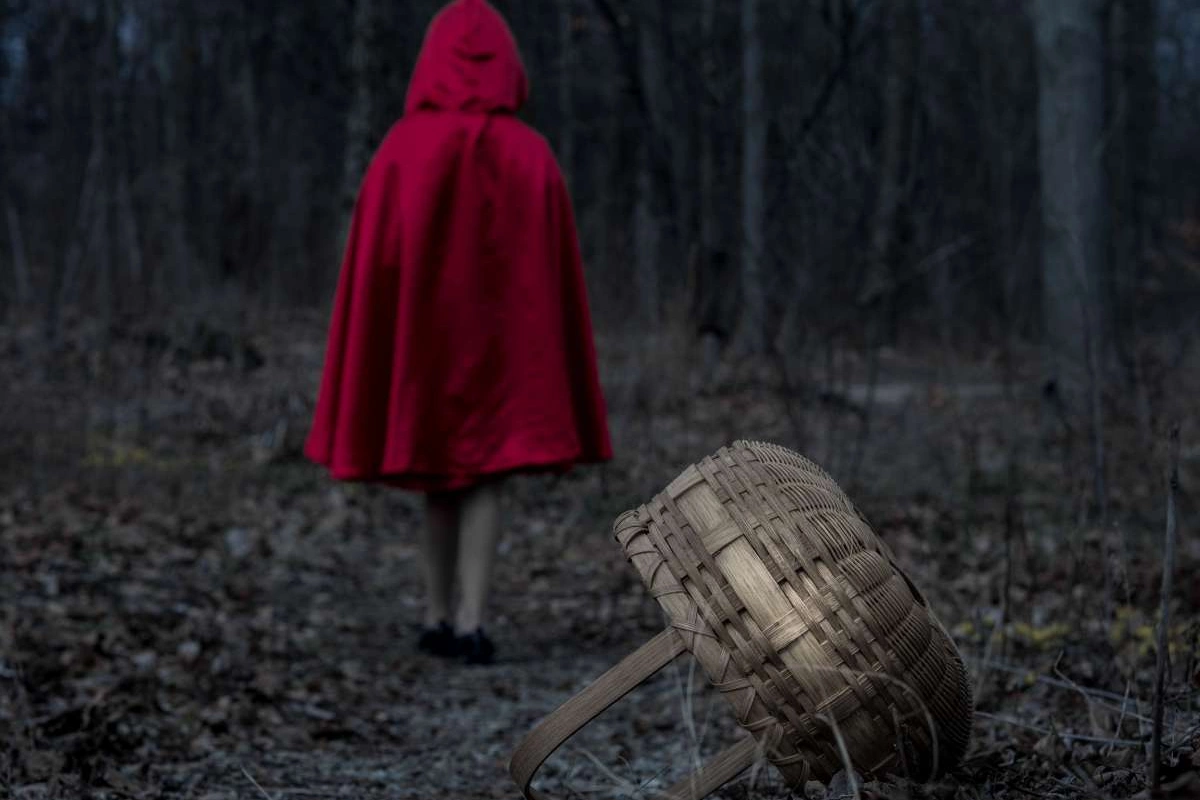
Duff Crerar shares his perspective on the effect of one-issue lobby groups on Canadian foreign policy.
Is Canada lost in the woods, armed only with good intentions? Image: Travis Fultz/Shutterstock
Little Red Riding Hood is a story of a girl who brings her lonely grandmother a basket of homecooked food. She has to walk through a dark forest and encounters a wolf (who wants to eat her, of course). She escapes the wolf through dumb luck and finally finds herself safe at her grandmother’s. Unfortunately, the wolf had already eaten her grandmother and is dressed up in her nightgown, waiting to pounce on the little girl.
This story reminds me of Canadian foreign policy. As an ingenue, wide-eyed “little red riding hood,” we like to think of ourselves as an “honest broker” with global weight, without giving thought to the wolves dressed in grandmother’s nightgown. Let me unpack it with a concrete example.
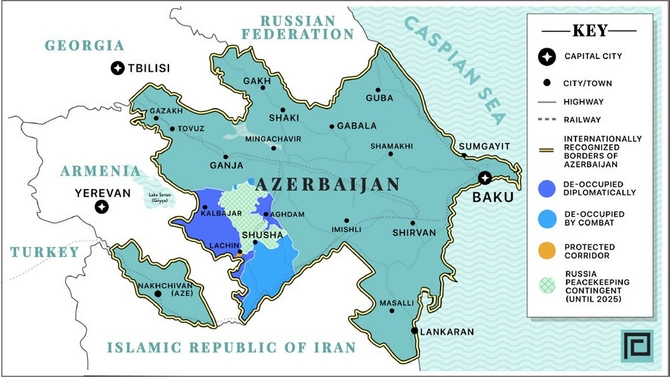
Last year in September, a war broke out in a seemingly far away region of South Caucasus between Azerbaijan and Armenia. The trigger for the war was the continued illegal occupation of Azerbaijan’s lands by Armenia for close to three decades and lack of progress in the peace process. Azerbaijan won back its internationally recognized territories. No country in the world, including the UN Security Council, disputed the outcome of the war. It was sealed in a statement witnessed by the Russia’s President Vladimir Putin and signed by Azerbaijan’s President Ilham Aliyev and Armenia’s Prime Minister Nikol Pashinyan.
While this war saw the usage of all sorts of weaponry, from mortars to flamethrower systems, the most prominent was the Unmanned Aerial Vehicles (UAVs) flown out by Azerbaijan, which appear to have swayed the balance of power in their favour. Most UAVs were purchased from Turkey and Israel, and some were produced domestically in Azerbaijan.
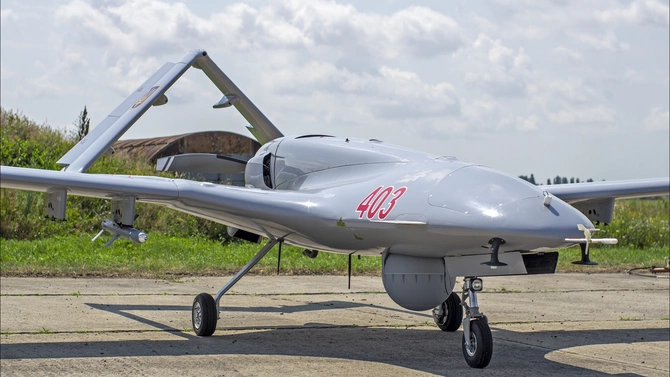
A Bayraktar TB2 drone, produced by Turkish Aerospace Industries (TAI). Image: photo vvl/Shutterstock
At the height of military operations in the conflict zone, a story broke out that some Canadian companies supplied parts to drones produced in Turkey and sold to Azerbaijan. Immediately after this, the Armenian National Committee of Canada (ANCC) and other Armenian-Canadian lobby groups rushed to the corridors of the Canadian government. The well-organized machinery of the lobby, oiled by the influencers, TV personalities and pundits began to operate in full. The dramatic outcry was focused on persuading the Canadian public that the deadly weapons, inside of which a few technical elements were produced in Canada, were being used by Azerbaijan to kill Armenian civilians that resided in the territories of Azerbaijan under the occupation of Armenia.
As we know from our textbooks, high-tech drones help avoid civilian casualties by precision targeting military installations. The casualties attest to this fact: 61 civilians of Armenian origin were killed in the military operations zone (within Azerbaijan’s sovereign territory) because of artillery and mortar fire. The number of civilian casualties from the Azerbaijani side is almost twice that – 101, and they all died in cities outside the military operations theatre (again within Azerbaijan’s sovereign territory).
Under pressure, the Trudeau government first suspended the sales of military equipment to Turkey, then cancelled all the export permits for drone technologies produced in Canada.
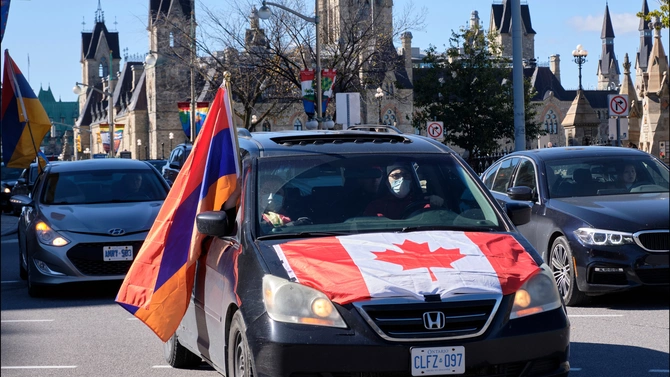
Canadian-Armenian car rally in Ottawa, October 11, 2020. Image: meandering images/Shutterstock
In a cacophony of all these events, many might have missed the news of the Ottawa-based Canadian company Telemus Systems filing for bankruptcy this summer. According to its still active website, the company was in business for 36 years and was a supplier of military-related electronic warfare products. The main reason for the shutdown was its inability to sell its products to the producer of those same UAV drones in Turkey.
Faced with the embargo, Turkish Aerospace Industries sought out other suppliers. Although Ottawa will perhaps be stung with reproaches about Canadian jobs lost (and the creation of about 40 unsecured creditors), what should be more unsettling is the influence wielded by the Armenian lobby group ANCC (Armenian National Committee of Canada), pushing Ottawa to declare the ban and portraying Turkey as a “rogue state.” It was the only interest group besides Project Ploughshares campaigning for this outcome.
Canadians have been led by one “regime,” the Liberal Party of Canada, through three elections. Like the naïve “little red riding hood” of the fairy-tale by the same name, Canada’s leadership presents our country as a force of good, “just trying to do the right thing” in an evil world. Like me, some Canadians don’t see ourselves entirely this way. We have played an important and positive role in two world wars and Korea, but we know our own history and the havoc our white ancestors wreaked on this land when they came here as European settlers. But for whatever reason, the image of Canada as generally friendly and soft-hearted has lived on internationally. Supporters of Justin Trudeau and indeed many Canadians, no matter the party, have embraced this image as part and parcel of what constitutes a Canadian identity.
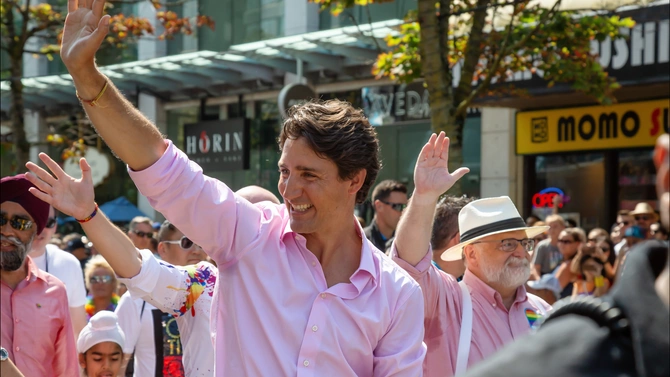
Justin Trudeau, Prime Minister and leader of the Liberal Party of Canada, in Vancouver, British Columbia. August 5, 2018: EB Adventure Photography/ Shutterstock
Canadians may not be particularly concerned by the disappearance of another weapons producer in Canada. Many still hold to the anti-war, “merchants of death” view that crippled military preparations (and intimidated the Liberal Mackenzie King Government) until the brink of 1939. Canada also sacrifices a domestic defence capability on the political altar of innocence and clean hands at a time when our country may be entering an era when deterrence will be one of our few tools to maintain a crumbling bulwark of peace. We may need those optics and electronics ourselves! Ukraine has recently started using Turkish drones against the Russian-backed separatists and the occupying Russian forces in Eastern Ukraine. Maybe it’s time to reverse the policy?
As I have mentioned before, Canadians and their Liberal government (though I doubt at this point that any Canadian political party would be better informed) drifts along the default path carved a century ago and rigorously reinforced by one lobby group. To maintain its reputation as an innocent and wide-eyed hero, Canada pulls up its red hood - sacrificing jobs and domestic defence capabilities we may yet need, and not that far in the distant future.
Our leadership wants to pay heed to the myriad of minority groups represented in the great white north and tries to do what seems virtuous. Unfortunately, sometimes too much high-mindedness and good intentions play into the hands of the foxes – and the wolves behind them.
Share on social media